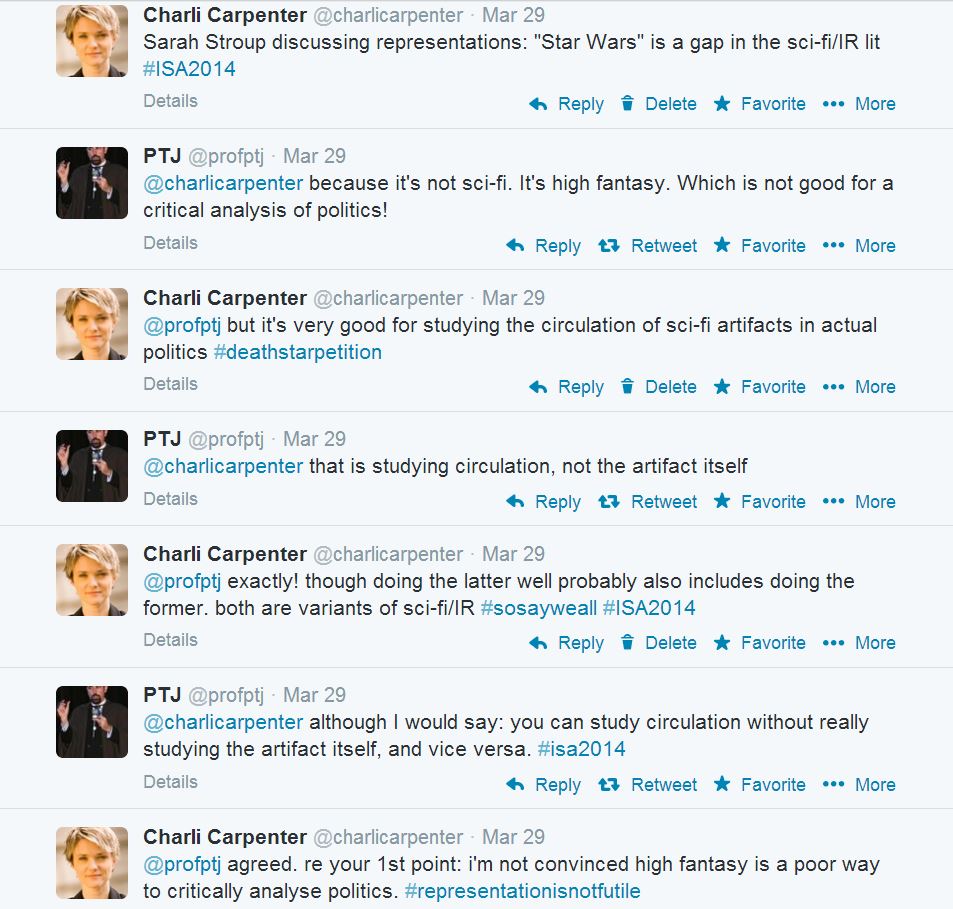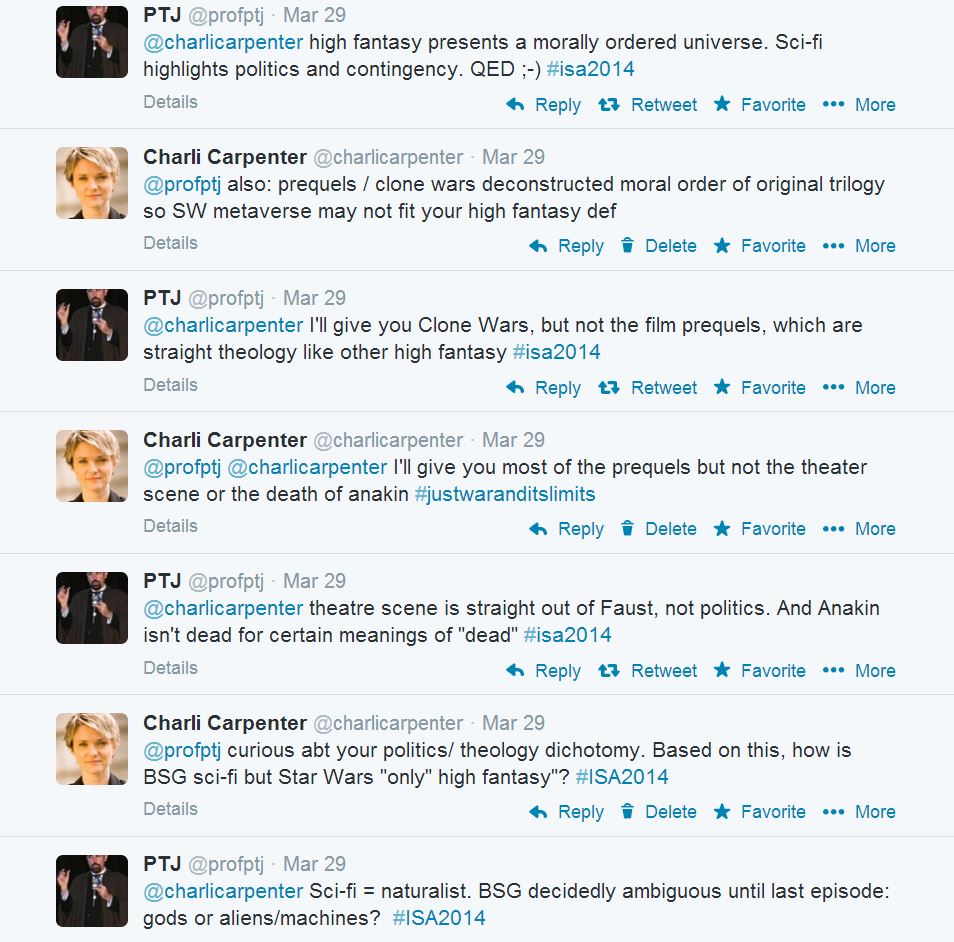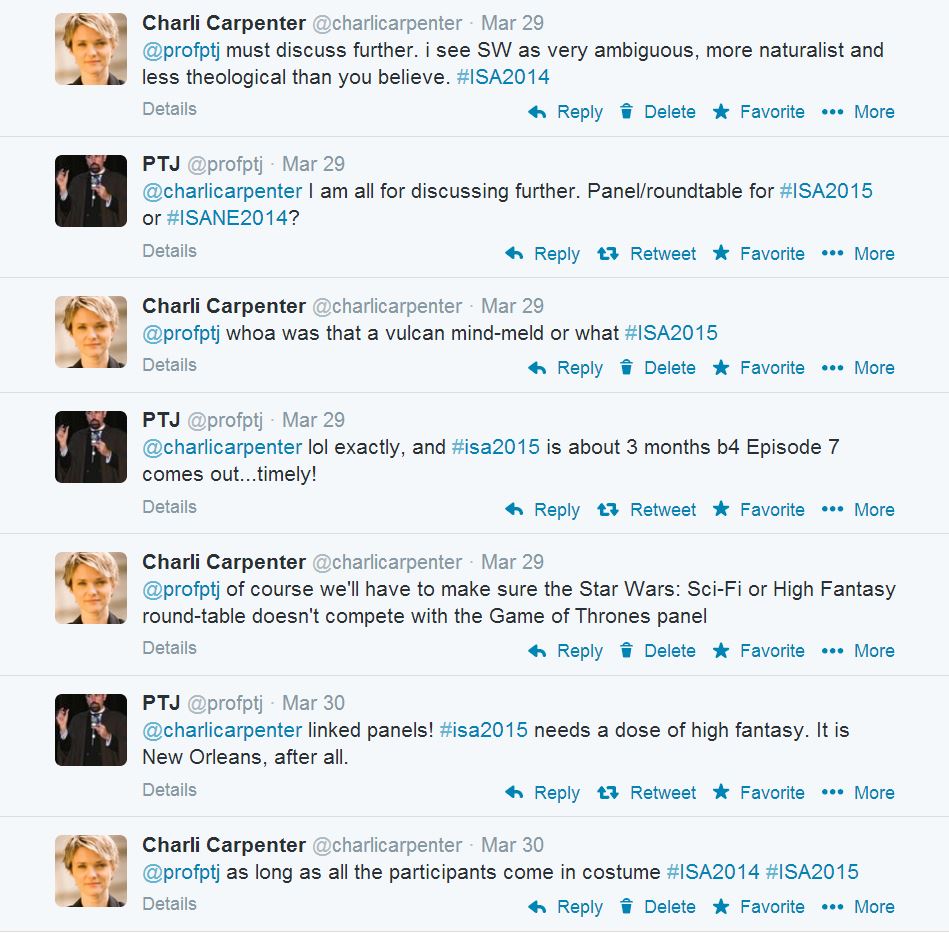Many Ducks are posting about their highlights from #ISA2014. Mine – aside from the Bloggers’ Reception and the many smart junior scholars I met in the lobby – was a meta-theoretical twitter conversation with former Duck Patrick Thaddeus Jackson occurring as I was headed to the airport.
First the context. Just before departing, I live-tweeted Chris Tenove‘s “Representations Beyond Borders” panel (description here) after my presentation on same. There were many terrific papers: Wendy Wong and Ron Levi on “money as representation”; Chris on who gets to represent the aggrieved at the ICC; Hans-Peter Schmitz on how representations of acoholics prevent alcohol from being taken seriously as a global problem despite its global health burden.
My paper was on science fiction representations in advocacy campaigns (here is the YouTube trailer). While discussing my paper, Sarah Stroup observed that scholars of the sci-fi/IR intertext have largely (and surprisingly) neglected Star Wars. When I tweeted thus, the great PTJ (from somewhere else at the conference) replied with:

The rest of the conversation is below the fold, but suffice to say even if I accept PTJ’s definitions of science fiction and high fantasy (and I’m not at all sure I do) I am unconvinced that Star Wars is
- a) pure theology and no science/naturalism*
- b) a morally ordered rather than contingent universe** or
- c) that either of these claims would render Star Wars apolitical if true.***
Indeed as an empirical if not interpretive “fact,” (though let it be noted that PTJ and I also disagree on the definition of ‘facts’), Star Wars is understood as and increasingly invoked in ways that are extremely political and subversive.
Now I don’t know exactly what is going on here – the Sith Lord has been barred from the ballot in Ukraine – but I do (tentatively) think PTJ and I agree on three things:
- 1) We need a stronger research agenda linking the interpretation of sci-fi artifacts to the study of their circulation in our world
- 2) Sarah Stroup is right that the Star Wars gap in the IR/sci-fi literature is interesting and puzzling and
- 3) there is much-greater-than-zero chance of a Star Wars roundtable at ISA in New Orleans in which PTJ will show up in costume.
What do readers think? Does Star Wars count as science fiction? And if so, what explains the Star Wars gap in the literature?
___________________________________
*To be fair, the “Jedi religion” is framed as a kind of righteous wizardry in the originals, but that said there’s plenty of science in the fiction of Star Wars. Even the Force is essentially an energy field consistent with quantum theory, and in the prequels we get glimpses into a bio-chemical basis for Jedi power in the midi-chlorians, so I think even the “magic” can at least argued to turn on science rather than theology or at least that this dichotomy might be worth interrogating.
**The originals were perhaps more ‘morally ordered’ than something like Battlestar Galactica, in that there are clear good guys and bad guys and epic battles between good and evil and the lines aren’t often blurred; but surely these easy dichotomies are chipped away at by elements in the prequels and later Clone Wars that introduced complexity, contingency, and perspective.
Charli Carpenter is a Professor in the Department of Political Science at the University of Massachusetts-Amherst. She is the author of 'Innocent Women and Children': Gender, Norms and the Protection of Civilians (Ashgate, 2006), Forgetting Children Born of War: Setting the Human Rights
Agenda in Bosnia and Beyond (Columbia, 2010), and ‘Lost’ Causes: Agenda-Setting in Global Issue Networks and the Shaping of Human Security (Cornell, 2014). Her main research interests include national security ethics, the protection of civilians, the laws of war, global agenda-setting, gender and political violence, humanitarian affairs, the role of information technology in human security, and the gap between intentions and outcomes among advocates of human security.




First of all, note that my Disqus icon to the left here is from Episode III.
Second, I will totally show up in costume for a roundtable at #isa2015. Just have to decide whether it will be “Episode IV Obi-Wan” or “Clone Wars Obi-Wan.”
Third, I want to make sure that we differentiate between the claims “Star Wars is not political” and “Star Wars (like most high fantasy) is not the best vehicle for the study of politics.” I would agree with you that the first claim would be silly. But the second: I stand by my position that high fantasy, presenting a morally ordered universe that lends itself to tragic and vision-quest-y and “the time is out of joint/o cursed spite/ that e’er I was born to put it right!” kinds of plot lines, is not really about politics in the sense that we social scientists and social theorists tend to study it. The “theory” of Star Wars, as I have argued elsewhere (on this very blog: https://www.whiteoliphaunt.com/duckofminerva/2013/02/the-lost-jedi-art-of-reading-closely.html), is a fall-and-redemption narrative involving mystical energy fields and cosmic destinies; there’s not much room there for politics, which is to say, the messy and active shaping of the world through negotiation and accommodation and the slow boring of hard boards. If there is an overarching “destiny” structure to the world, politics is an irrelevant side-show, which is part of why the Senate is so feckless in the Star Wars universe — the real action is, and always was, elsewhere.
In the way that most people use the categories ‘science fiction’ and ‘fantasy’ to differentiate pieces of media, in ordinary language, Star Wars is probably best classified as science fiction. It’s in space, has got spaceships, laser guns that go pew-pew, and the lightsabers don’t have names. What you seem to be doing – and I am with you in this endevour – is reconstructing the difference between fantasy and science fiction so that it instead reflects differences in the relationships between moral order, technology, politics and struggle, and the overarching themes and tropes that drive the narrative. The question for most people will probably be ‘what does this get us?’, and so showcasing the value-added of this approach would be a pretty great project.
I agree with Simon here. While I think PTJ has it right in saying that Star Wars is not a great classroom (or theoretical) tool for political science since it depicts a morally ordered universe filled with theological themes and leaves out the contingency inherent in politics (at least for me), using this to say that it is not science fiction can be problematic since most people see science fiction as related to ‘science’ and therefore dealing with space (yes, science can mean other things…). It seems like picking an argument that i am not sure needs to be picked. Why can’t Star Wars be science fiction but also have a morally ordered universe?
I can actually see a 2×2 (political science FTW!) here with sci-fi/fantasy (i.e. space/future vs. medieval settings or maybe the use of ‘science’ in the story) as one axis and order/contingency as the other. Star Wars, LoTR, ASOIAF (this is my bugaboo, by PTJs definition this is sci-fi no? That seems weird to me…), and say, the Ender Series would each represented a different box. Of course, I am not sure what this accomplishes per se other than getting us past a discussion on whether or not Star Wars is Science Fiction or not.
From “How I Met Your Mother”
Ted: So, those new Star Wars movies… Those are better than the old ones?Barney: Yeah. The first three barely mention the intricacies of intergalactic trade law.
I never really thought of SW as SF before, I usually think of the Asimov/Clarke/Bradbury catalog when I imagine classical scifi. So I naturally lean towards PTJ on this one, but Charli’s arguments are intriguing.
Also consider, are you including the extended universe of the books and video games? I would argue a younger generation is growing up with their first exposure of SW to the excellent “KOTAR” and “Force Unleashed” material/
On a political sigh-ence level, there’s definitely a lot of intriguing political elements of the SW universe that could make for a ISA panel (or a post-ISA mock presentation at the bar).
Whether it is sci-fi or not, SW’s enduring cultural relevance over the years signals that there is something significant about it. If anything, it’d be a wonderful pedagogical tool to help undergrads understand polisigh concepts like asymmetrical warfare, comparative politics, and levels-of-analysis.
Hello! I run Blog Tarkin, which is devoted to IR / Strategic thinking and science fiction, with a special fondness for Star Wars. The writing is out there.
Of course! I think Sarah was referring to literature published in scholarly books and journals, like the BSG and IR or Harry Potter and IR volumes, etc. Do you know of any? It’s true I’ve not seen much.
to be fair, Charli, there are not heaps of IR and BSG and heaps of IR and HP books–one or two each… So, not that big of a difference. I know I have used Star Wars in my classes and my blogs for years. I just don’t write academic pieces that analyze pop culture. I tend to prefer whimsy and silly over inter-textual analysis [yes, I am subtweeting that the HP panel at the ISA years ago had more than a few papers that sucked the fun out of it]. On the other hand, there is a link in my NATO book in the conclusion to my duck piece that applied the lessons I learned to SHIELD/Avengers relations. https://duckofminerva.blogspot.ca/2012/05/shield-and-us-how-realistic-is-avengers.html
good point. but that said i can think of a fair number of Star Trek articles, for example – Jackson and Nexon, Carpenter, Buzan, Weldes – so why not Star Wars?
This is the sort of ambiguity that technical jargon is supposed to fix. The colloquial terms ‘science fiction’ and ‘fantasy’ are used as if they refer to genres, but conceptually they refer to a different type of storytelling category. If what you care about are cultural depictions of technology, then “science fiction” is a fine category to put Star Wars in. If instead you care about a more determined theoretical exploration of a premise, the genre you’re looking for is speculative fiction, which Star Wars is clearly not. In this case, high fantasy is a reasonably good descriptor.
Yeah. I agree.
BSG, Star Trek, Star Wars, Game of Thrones, Lord of the Rings and the Simpsons are all ‘fantasy’, but only 3 of them are Sci Fi (Fantasy). One of the ‘normal’ restrictions re Sci Fi rather than ‘fantasy’ is that is remains at least notionally consistent with ‘science’; on that account all of the above are more fantasy that sci-fi.
Much depends, though, on how “consistency” is defined. That strikes me as more of a continuum: “hard” SF that directly incorporates contemporary scientific accounts, more “speculative” stuff that isn’t a direct extension of but also isn’t prohibited by current scientific knowledge, and “science-y” stuff that provides an alternate (fake) “scientific” (i.e., naturalist) background against which events unfold. And lots of intermediate cases. Star Wars doesn’t fit on this continuum at all, in my view.
I’m with PTJ on this. Star Wars uses its SF elements as little more than decorative set pieces in what is essentially a traditional fantasy story, complete with a morally ordered universe in which concepts like fate and redemption are arguably the primary drivers of political and societal shifts. That, in my opinion, makes it fairly hard to use the SW universe as a lens through which to discuss political issues, just as something like the world of Middle-earth is fairly ill-suited for this purpose.
The discussion of the borders between science-fiction and fantasy is a very old one, though, and I fully acknowledge that my viewpoint is a contested one. (see Darko Suvin, Fredric Jameson, David Seed, Carl Freedman, even China Miéville. Hell, it goes all the way back to the ‘debate’ between Wells and Verne in the 1890s).
The “first great debate” ;-)
Hi all, sorry I’m a little late to join in. My original comment to Charli was based on no special understanding of the sci-fi/high fantasy divide – I am totally ignorant here. My comment about Star Wars was prompted by Charli’s employment of sci-fi as independent variable – a causal force that shapes real world politics. I immediately thought of Star Wars, Reagan, and SDI, and I imagined something along the lines of this (https://www.historytoday.com/peter-kramer/ronald-reagan-and-star-wars) from this growing community of “sci-fi in IR” scholars.
I harken back to the days of editor John Campbell’s efforts to delineate/promote the SciFi part of the F&SF as requiring construction of a fictional universe not inconsistent with our understanding ( ? ) of ‘natural law’. Whether Star Wars or Star Trek, we ignore/assume the ability to shield from momentum of impacts at stellar velocities and acquire power sufficient for transportation needs via manipulation of space/time ( interesting since time is not a constant and may well be subjective ) in any Space Opera. And this differs from the spoofs of L. Ron Hubbard how, exactly ?
When fiction is based on exploring a reality modified by social mores following rules of proposed changes, is not the ‘fantasy’ definition somewhat irrelevant ? Perhaps George Orwell, Dr. Huxley, Orson Welles, Orson Scott Card or David Brin cross these barriers as easily as Larry Niven, who seems to mix them with impunity.